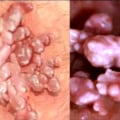Genital warts are a common sexually transmitted infection (STI) that is spread through skin-to-skin contact during sexual activity. It is most commonly transmitted through vaginal or anal intercourse, but can also be spread through the sharing of sex toys and, rarely, through oral sex. Even if a person with HPV has no visible signs or symptoms, they can still pass on the infection to another person. The female reproductive organs are located in the lower abdomen and genital warts can develop in the mouth or throat of someone who has had oral sexual contact with an infected individual.
It is possible to transmit the infection even if warts are not visible. Warts usually appear 1 to 6 months after being infected with HPV, but it is possible to be infected without having any visible warts. A vaccine is available to protect against types of HPV that pose a high risk of genital warts and cervical cancer. Limiting the number of sexual partners and getting vaccinated are both effective ways to prevent genital warts.
If you have been diagnosed with genital warts, your current sexual partners should be tested as they may have warts without knowing it. Additionally, it is important to get screened for cancer of the cervix, vagina, vulva, or anus if you have been diagnosed with genital warts. The HPV vaccine offered to girls and boys aged 12 to 13 in England protects against cervical cancer and genital warts. If you have genital warts, a healthcare provider should examine all of your sexual partners and treat them if any warts are found.










